CBS Pulls Planned Colbert Interview with Texas Senate Candidate Amid FCC Equal-Time Concerns
A planned interview between “The Late Show with Stephen Colbert” and Texas State Rep. James Talarico, a Democratic candidate for U.S. Senate, was pulled from broadcast at the last-minute last night (2/16) after CBS executives cited concerns related to federal broadcast regulations.
Colbert talked about the decision during the show’s opening monologue, telling viewers that network attorneys had advised against airing the interview due to potential implications under the Federal Communications Commission’s “equal time” rule. The rule requires broadcast licensees to provide equal opportunities to legally qualified candidates for public office if one candidate is given airtime.
interview due to potential implications under the Federal Communications Commission’s “equal time” rule. The rule requires broadcast licensees to provide equal opportunities to legally qualified candidates for public office if one candidate is given airtime.
Historically, late-night talk shows have relied on exemptions to the rule, including classifications as “bona fide news interviews” or entertainment programming. However, recent statements from FCC leadership have prompted renewed scrutiny.
 FCC Chairman Brendan Carr has indicated that the Commission is reviewing how those exemptions are applied, particularly in the context of high-profile entertainment programs that feature political figures. While no formal rule change has been adopted, CBS reportedly acted out of caution, concerned that airing the interview could trigger equal-time obligations for opposing candidates.
FCC Chairman Brendan Carr has indicated that the Commission is reviewing how those exemptions are applied, particularly in the context of high-profile entertainment programs that feature political figures. While no formal rule change has been adopted, CBS reportedly acted out of caution, concerned that airing the interview could trigger equal-time obligations for opposing candidates.
Colbert said CBS had initially instructed him not to reference the decision on air, a directive he chose to disregard. During the broadcast, he explained the network’s reasoning to viewers and criticized the uncertainty surrounding the FCC’s current posture on candidate appearances.
The interview itself was recorded but not broadcast on CBS. Instead, it was released online through The Late Show’s digital platforms. The FCC’s equal-time rules apply to over-the-air broadcasters but do not extend to online streaming or social media platforms, allowing the interview to be distributed outside the broadcast context.
Colbert took the opportunity to point out what he characterized as uneven regulatory treatment across media platforms, noting that political commentary on talk radio continues without comparable intervention. The FCC has not announced any new enforcement actions related to talk radio or late-night television programming.
Neither CBS nor the FCC issued formal statements Monday night addressing the specific decision. Carr has not publicly commented on the Colbert episode but has previously stated that the Commission is obligated to ensure consistent application of federal communications law.
The incident has renewed debate within the media industry over how equal-time rules should apply in a fragmented media landscape where political discourse routinely occurs across broadcast, cable, and digital platforms.



 competition local radio stations today face for audiences and vital advertising revenues from online and satellite content providers and digital ad platforms not subject to any comparable restrictions on their scale and scope; the dire negative effects that consumer and advertiser substitution of competing digital audio content and advertising for traditional radio has had on the listenership and advertising revenues garnered by local radio stations, including in mid-sized and small markets; and how the retention of asymmetric ownership restrictions has prevented radio broadcasters from gaining local scale to take advantage of important economic efficiencies, obtain investment capital, and better compete for audiences and advertising revenues, and thus enhance – or even maintain – their provision of news, emergency information, and valued entertainment and sports programming in local communities across the country at no cost to the public.” Responding to testimony from musicFirst Coalition and the Future of Music Coalition – referred to as the Coalitions – NAB writes, “First, the fact that the Coalitions continue to hold themselves out as protectors of small, local independent broadcasters not just borders on the absurd but crosses over into full-blown absurdity. The Coalitions represent the interests of the music industry, which is dominated by three consolidated international record labels. Compared to even the largest radio station groups, the giant record labels are the 800-pound gorillas of the music world. Those three labels earn billions more in revenue than the approximately 11,000 full-power commercial AM/FM stations combined. As NAB earlier reported, the three major music companies jointly generated about $2.9 million per hour in 2023. In remarkable contrast, in 2023 and 2024 the vast majority of radio stations garnered less – and often much less – than $2.9 million per year in advertising revenues. Needless to say, the Coalitions have never explained how local radio stations earning such low levels of revenue (and even lower, if any, profits) are supposed to keep talented employees and provide high quality programming, including popular music, sports, and informational programming, such as weather updates and emergency information, OTA and free to the public without achieving increased local scale, greater economic efficiencies, and more robust ad revenues.
competition local radio stations today face for audiences and vital advertising revenues from online and satellite content providers and digital ad platforms not subject to any comparable restrictions on their scale and scope; the dire negative effects that consumer and advertiser substitution of competing digital audio content and advertising for traditional radio has had on the listenership and advertising revenues garnered by local radio stations, including in mid-sized and small markets; and how the retention of asymmetric ownership restrictions has prevented radio broadcasters from gaining local scale to take advantage of important economic efficiencies, obtain investment capital, and better compete for audiences and advertising revenues, and thus enhance – or even maintain – their provision of news, emergency information, and valued entertainment and sports programming in local communities across the country at no cost to the public.” Responding to testimony from musicFirst Coalition and the Future of Music Coalition – referred to as the Coalitions – NAB writes, “First, the fact that the Coalitions continue to hold themselves out as protectors of small, local independent broadcasters not just borders on the absurd but crosses over into full-blown absurdity. The Coalitions represent the interests of the music industry, which is dominated by three consolidated international record labels. Compared to even the largest radio station groups, the giant record labels are the 800-pound gorillas of the music world. Those three labels earn billions more in revenue than the approximately 11,000 full-power commercial AM/FM stations combined. As NAB earlier reported, the three major music companies jointly generated about $2.9 million per hour in 2023. In remarkable contrast, in 2023 and 2024 the vast majority of radio stations garnered less – and often much less – than $2.9 million per year in advertising revenues. Needless to say, the Coalitions have never explained how local radio stations earning such low levels of revenue (and even lower, if any, profits) are supposed to keep talented employees and provide high quality programming, including popular music, sports, and informational programming, such as weather updates and emergency information, OTA and free to the public without achieving increased local scale, greater economic efficiencies, and more robust ad revenues.  competition, raise prices for consumers, and damage local news across the country. If the deal is approved, Nexstar would become the largest TV station owner in the nation owning 244 television stations across 44 states. Newsmax CEO Christopher Ruddy says, “This merger would create an unprecedented and dangerous consolidation within the broadcast TV industry, giving them immense control over local news and political news coverage.” Newsmax says that the national television ownership cap was set by Congress at 39% of U.S. television households in 2004 and explicitly stripped the FCC of authority to modify it and argues that any change in the cap by the FCC, including waivers, is a direct violation of law.
competition, raise prices for consumers, and damage local news across the country. If the deal is approved, Nexstar would become the largest TV station owner in the nation owning 244 television stations across 44 states. Newsmax CEO Christopher Ruddy says, “This merger would create an unprecedented and dangerous consolidation within the broadcast TV industry, giving them immense control over local news and political news coverage.” Newsmax says that the national television ownership cap was set by Congress at 39% of U.S. television households in 2004 and explicitly stripped the FCC of authority to modify it and argues that any change in the cap by the FCC, including waivers, is a direct violation of law.  but sources tell Reuters that it would likely be sometime after November. Senate Commerce Committee Chair Ted Cruz criticized Carr for comments he made on the Benny Johnson podcast about late night talk host Jimmy Kimmel’s joke that appeared to threaten ABC/Disney and promise FCC action against the company if it didn’t take action on its own. On his Premiere Networks distributed podcast, “The Verdict with Ted Cruz,” Cruz said of Carr’s comments, “I got to say that’s right out of ‘Goodfellas.’ That’s right out of a Mafioso coming into a bar going, ‘Nice bar you have here. It would be a shame if something happened to it.’” Carr recently said that’s not what he meant and stated, “We don’t want to see weaponization of government by any administration against any perspective – and that’s certainly not what we’re doing here.”
but sources tell Reuters that it would likely be sometime after November. Senate Commerce Committee Chair Ted Cruz criticized Carr for comments he made on the Benny Johnson podcast about late night talk host Jimmy Kimmel’s joke that appeared to threaten ABC/Disney and promise FCC action against the company if it didn’t take action on its own. On his Premiere Networks distributed podcast, “The Verdict with Ted Cruz,” Cruz said of Carr’s comments, “I got to say that’s right out of ‘Goodfellas.’ That’s right out of a Mafioso coming into a bar going, ‘Nice bar you have here. It would be a shame if something happened to it.’” Carr recently said that’s not what he meant and stated, “We don’t want to see weaponization of government by any administration against any perspective – and that’s certainly not what we’re doing here.” and radio industry CEOs are pleased with the probability that they will be loosened. Cumulus Media president and CEO Mary G. Berner states, “We’re encouraged that Chairman Carr and the FCC are advancing the 2022 Quadrennial Review. Quickly modernizing the radio ownership rules is essential for listeners who rely on local radio every day. With updated
and radio industry CEOs are pleased with the probability that they will be loosened. Cumulus Media president and CEO Mary G. Berner states, “We’re encouraged that Chairman Carr and the FCC are advancing the 2022 Quadrennial Review. Quickly modernizing the radio ownership rules is essential for listeners who rely on local radio every day. With updated  rules, companies like ours can invest more locally, diversify our offerings, and compete effectively in today’s rapidly evolving audio landscape. We look forward to working with the Commission to make these updates.” Beasley Media Group CEO Caroline Beasley comments, “We would like to thank Chairman Carr for moving forward with the quadrennial review on this critical endeavor. This is a defining moment for our industry to ensure that local radio can continue to fulfill its essential public service mission for decades to come. We look forward to working with the Commission to implement common-sense reforms that will allow broadcasters to compete fairly and keep serving the local audiences who rely on us every day.”
rules, companies like ours can invest more locally, diversify our offerings, and compete effectively in today’s rapidly evolving audio landscape. We look forward to working with the Commission to make these updates.” Beasley Media Group CEO Caroline Beasley comments, “We would like to thank Chairman Carr for moving forward with the quadrennial review on this critical endeavor. This is a defining moment for our industry to ensure that local radio can continue to fulfill its essential public service mission for decades to come. We look forward to working with the Commission to implement common-sense reforms that will allow broadcasters to compete fairly and keep serving the local audiences who rely on us every day.” radio spots across 192 media markets, generating more than 1 billion impressions and $43 million in airtime from TV and radio stations. NAB president and CEO Curtis LeGeyt says, “Local stations are serving communities with live sports, trusted local news and life-saving emergency coverage – all available for free to every American. But outdated rules are shackling these stations from growing and innovating at a time when Big Tech operates with limitless scale and zero public interest obligations. Consumers deserve more – not fewer – local journalists on the ground and live sporting events accessible without a subscription. The FCC must act quickly to level the playing field so broadcasters can continue investing in the content communities rely on most.”
radio spots across 192 media markets, generating more than 1 billion impressions and $43 million in airtime from TV and radio stations. NAB president and CEO Curtis LeGeyt says, “Local stations are serving communities with live sports, trusted local news and life-saving emergency coverage – all available for free to every American. But outdated rules are shackling these stations from growing and innovating at a time when Big Tech operates with limitless scale and zero public interest obligations. Consumers deserve more – not fewer – local journalists on the ground and live sporting events accessible without a subscription. The FCC must act quickly to level the playing field so broadcasters can continue investing in the content communities rely on most.” receive on our mobile phones. With underlying frameworks that are 31 and 13 years old respectively, we think it’s time to explore if structural changes to these systems are needed, with an eye towards making sure we are leveraging the latest technology to save lives. Similarly, we will also vote to initiate a review of our system for collecting real-time data on network outages and restoration during and after major disasters. Since its inception in 2007, our Disaster Information Reporting System (DIRS) has proven to be a valuable tool for collecting actionable information to help with recovery efforts. While the DIRS reports are valuable, they can be time-consuming to produce, drawing resources away from responding to an ongoing disaster. The Commission will vote on reforms to streamline DIRS to make sure that its benefits outweigh its burdens. We’ll close our August meeting by removing unnecessary regulations and injecting common sense across the Commission’s policies—critical features to streamline the implementation of our Build America Agenda.”
receive on our mobile phones. With underlying frameworks that are 31 and 13 years old respectively, we think it’s time to explore if structural changes to these systems are needed, with an eye towards making sure we are leveraging the latest technology to save lives. Similarly, we will also vote to initiate a review of our system for collecting real-time data on network outages and restoration during and after major disasters. Since its inception in 2007, our Disaster Information Reporting System (DIRS) has proven to be a valuable tool for collecting actionable information to help with recovery efforts. While the DIRS reports are valuable, they can be time-consuming to produce, drawing resources away from responding to an ongoing disaster. The Commission will vote on reforms to streamline DIRS to make sure that its benefits outweigh its burdens. We’ll close our August meeting by removing unnecessary regulations and injecting common sense across the Commission’s policies—critical features to streamline the implementation of our Build America Agenda.”  end of this week. It has been the greatest honor of my professional life to serve the American people as a Commissioner. I am deeply honored to have been entrusted with this responsibility by President Donald J. Trump during his first term.
end of this week. It has been the greatest honor of my professional life to serve the American people as a Commissioner. I am deeply honored to have been entrusted with this responsibility by President Donald J. Trump during his first term.  regulatory burdens. We received great feedback from a range of stakeholders already and plan on eliminating onerous, antiquated, and unlawful requirements across the board.” Carr added, “And we have been delivering these results with a focus on efficiency. At the beginning of Fiscal Year 2025, the FCC employed 1,461 full-time employees. As of April 28, 2025, the FCC employed 1,383 full-time employees. The difference over the last six months can be attributed to many factors, including FCC employees who took advantage of the early retirement window opened by my predecessor, the deferred resignation program offered by President Trump, and natural turnover. The agency is well positioned to continue carrying out its statutory mission for the remainder of Fiscal Year 2025 and beyond.”
regulatory burdens. We received great feedback from a range of stakeholders already and plan on eliminating onerous, antiquated, and unlawful requirements across the board.” Carr added, “And we have been delivering these results with a focus on efficiency. At the beginning of Fiscal Year 2025, the FCC employed 1,461 full-time employees. As of April 28, 2025, the FCC employed 1,383 full-time employees. The difference over the last six months can be attributed to many factors, including FCC employees who took advantage of the early retirement window opened by my predecessor, the deferred resignation program offered by President Trump, and natural turnover. The agency is well positioned to continue carrying out its statutory mission for the remainder of Fiscal Year 2025 and beyond.”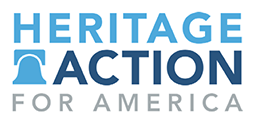 1940s, when broadcast dominated mass communications in the U.S. Since then, the media marketplace has changed drastically – from widespread deployment of cable and satellite television networks to the rise of social media, podcasts, and streaming. Local broadcasters compete directly with Big Tech, streaming services, and social media platforms in the marketplace of consumer content. Yet, unlike their competitors such as YouTube and Facebook, broadcasters are limited by the ownership rules in how many households and consumers they can reach. This is an inherent disadvantage.” The letter adds, “By eliminating the national television cap, local TV duopoly restrictions, and local radio ownership caps, broadcasters can better achieve the scale and efficiencies necessary to compete – and to attract vital investment – in a fragmented and rapidly evolving information market.”
1940s, when broadcast dominated mass communications in the U.S. Since then, the media marketplace has changed drastically – from widespread deployment of cable and satellite television networks to the rise of social media, podcasts, and streaming. Local broadcasters compete directly with Big Tech, streaming services, and social media platforms in the marketplace of consumer content. Yet, unlike their competitors such as YouTube and Facebook, broadcasters are limited by the ownership rules in how many households and consumers they can reach. This is an inherent disadvantage.” The letter adds, “By eliminating the national television cap, local TV duopoly restrictions, and local radio ownership caps, broadcasters can better achieve the scale and efficiencies necessary to compete – and to attract vital investment – in a fragmented and rapidly evolving information market.”  regulatory framework, beginning with long-overdue reforms to the national television ownership cap and the local radio and TV ownership rules. NAB president and CEO Curtis LeGeyt states, “This is a moment for bold ideas, and NAB is proud to lead the charge. The FCC’s rules should reflect today’s media landscape, not one from decades past. Our filing lays out a clear, actionable path to modernize regulations and empower local radio and TV stations to better serve their communities. We appreciate the Commission, especially Chairman Carr, for launching this important effort. Reforming outdated ownership rules is the essential first step to strengthening local journalism and ensuring broadcasters can continue to survive.”
regulatory framework, beginning with long-overdue reforms to the national television ownership cap and the local radio and TV ownership rules. NAB president and CEO Curtis LeGeyt states, “This is a moment for bold ideas, and NAB is proud to lead the charge. The FCC’s rules should reflect today’s media landscape, not one from decades past. Our filing lays out a clear, actionable path to modernize regulations and empower local radio and TV stations to better serve their communities. We appreciate the Commission, especially Chairman Carr, for launching this important effort. Reforming outdated ownership rules is the essential first step to strengthening local journalism and ensuring broadcasters can continue to survive.”  Carr of “illegally targeting broadcast networks and media companies perceived to be unfavorably covering the Trump Administration – wasting critical agency resources on bogus investigations in the process.” The lawmakers are also questioning Carr’s “commitment to his agency’s independence, given his frequent trips with the president to Mar-a-Lago and his targeting of entities that the president has criticized or sued in his personal capacity.” Committee Ranking Members says that “under Carr’s leadership, the FCC has harassed CBS for routine editing practices, reinstated lawfully denied complaints against ABC and NBC, launched a bogus investigation into KCBS-AM in San Jose simply for reporting publicly available information, and directed the FCC’s Enforcement Bureau to launch investigations into NPR and PBS based on false allegations.” The Committee is requesting documents and communications “related to its investigations of media entities,” “all communications between Carr and current White House officials and between Carr and other Trump Administration officials that relate to investigations,” as well as Carr’s travel records.
Carr of “illegally targeting broadcast networks and media companies perceived to be unfavorably covering the Trump Administration – wasting critical agency resources on bogus investigations in the process.” The lawmakers are also questioning Carr’s “commitment to his agency’s independence, given his frequent trips with the president to Mar-a-Lago and his targeting of entities that the president has criticized or sued in his personal capacity.” Committee Ranking Members says that “under Carr’s leadership, the FCC has harassed CBS for routine editing practices, reinstated lawfully denied complaints against ABC and NBC, launched a bogus investigation into KCBS-AM in San Jose simply for reporting publicly available information, and directed the FCC’s Enforcement Bureau to launch investigations into NPR and PBS based on false allegations.” The Committee is requesting documents and communications “related to its investigations of media entities,” “all communications between Carr and current White House officials and between Carr and other Trump Administration officials that relate to investigations,” as well as Carr’s travel records. 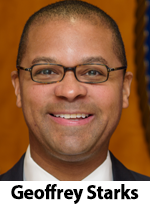 commissioner on the Federal Communications Commission has been the honor of my life. With my extraordinary fellow commissioners and the incredible career staff at the agency, we have worked hard to connect all Americans, promote innovation, protect consumers, and ensure national security. I have learned so much from my time in this position, particularly when I have heard directly from Americans on the issues that matter to them. I have been inspired by the passion, engagement and commitment I have seen from colleagues, advocates, and industry. Over the next few weeks, I look forward to working with the chairman and my fellow commissioners, and all FCC staff, to further the mission of the agency.” Starks is one of two Democrats currently serving on the Commission.
commissioner on the Federal Communications Commission has been the honor of my life. With my extraordinary fellow commissioners and the incredible career staff at the agency, we have worked hard to connect all Americans, promote innovation, protect consumers, and ensure national security. I have learned so much from my time in this position, particularly when I have heard directly from Americans on the issues that matter to them. I have been inspired by the passion, engagement and commitment I have seen from colleagues, advocates, and industry. Over the next few weeks, I look forward to working with the chairman and my fellow commissioners, and all FCC staff, to further the mission of the agency.” Starks is one of two Democrats currently serving on the Commission. Audacy. Before he was chairman, Carr had argued that the FCC should not allow a “Soros shortcut” but must follow FCC procedure. In June of last year Carr said the FCC had never previously used the “Soros-shortcut” procedure to approve licenses to a firm with significant foreign ownership. But Audacy argued in its opposition to the Petition to Deny (filed last summer) that there is nothing unique about this request, saying that the FCC “granting a limited waiver deferring its foreign ownership review to facilitate a licensee’s prompt emergence from bankruptcy is consistent with the Communications Act.” Audacy added that the notion that the limited waiver is new “completely ignores longstanding precedent establishing the Commission-approved special warrant process used in a number of prior transactions to allow licensees to emerge from bankruptcy promptly, while affording the Commission sufficient opportunity to review foreign ownership issues post-emergence.”
Audacy. Before he was chairman, Carr had argued that the FCC should not allow a “Soros shortcut” but must follow FCC procedure. In June of last year Carr said the FCC had never previously used the “Soros-shortcut” procedure to approve licenses to a firm with significant foreign ownership. But Audacy argued in its opposition to the Petition to Deny (filed last summer) that there is nothing unique about this request, saying that the FCC “granting a limited waiver deferring its foreign ownership review to facilitate a licensee’s prompt emergence from bankruptcy is consistent with the Communications Act.” Audacy added that the notion that the limited waiver is new “completely ignores longstanding precedent establishing the Commission-approved special warrant process used in a number of prior transactions to allow licensees to emerge from bankruptcy promptly, while affording the Commission sufficient opportunity to review foreign ownership issues post-emergence.” have had the privilege of working at the FCC for over a dozen years now, including serving previously as the agency’s General Counsel, and I am humbled by the opportunity to lead the FCC. The FCC has important work ahead – on issues ranging from tech and media regulation to unleashing new opportunities for jobs and growth through agency actions on spectrum, infrastructure, and the space economy. We will also advance America’s national security interests and protect consumers. I am eager to accelerate the FCC’s work on these and other fronts. I look forward to collaborating with the Trump Administration, my Commission colleagues, and the FCC’s talented staff as well as Congress to deliver great results for the American people.”
have had the privilege of working at the FCC for over a dozen years now, including serving previously as the agency’s General Counsel, and I am humbled by the opportunity to lead the FCC. The FCC has important work ahead – on issues ranging from tech and media regulation to unleashing new opportunities for jobs and growth through agency actions on spectrum, infrastructure, and the space economy. We will also advance America’s national security interests and protect consumers. I am eager to accelerate the FCC’s work on these and other fronts. I look forward to collaborating with the Trump Administration, my Commission colleagues, and the FCC’s talented staff as well as Congress to deliver great results for the American people.”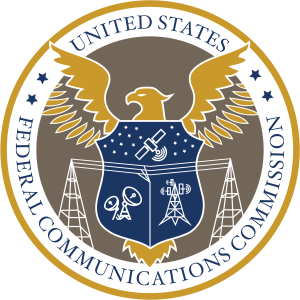
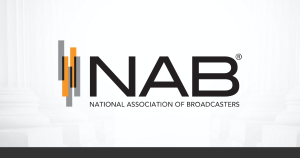 Under the Federal Communications Commission’s consideration is a proposal from Commander Communications Corporation that would create an FM broadcasting class known as “A10.” In addition to enhancing coverage in rural and underserved areas, it would grant power upgrades for roughly 1,400 Class A FMs, allowing a maximum of 10,000 watts. Approval would depend on a station’s geographical zone; tower height; and separation requirements. While the National Association of Broadcasters recognizes potential benefits for listeners – especially during emergencies – it urges caution owing to possible negative impacts. The NAB generally supports proposals designed to improve coverage areas, but says the “A10” proposal lacks technical analysis and information on how many stations may be upgradable. An NAB filing notes that, “While this could lead to improved service for additional listeners, it could also further squeeze the band in more markets and impact more FM services.” Also opposed is Cumulus Media, which cites an “unacceptable risk” to stations already competing against streaming services. Conversely, the Multicultural Media, Telecom & Internet Council favors the suggestion, stressing that many stations that would qualify for the upgrade are owned by minority and small-scale operators. This proposal would replace an earlier FCC one for a Class C4 FM station category. More than 100 independent and minority owners backed the idea, but it ran into opposition from larger companies and the NAB.
Under the Federal Communications Commission’s consideration is a proposal from Commander Communications Corporation that would create an FM broadcasting class known as “A10.” In addition to enhancing coverage in rural and underserved areas, it would grant power upgrades for roughly 1,400 Class A FMs, allowing a maximum of 10,000 watts. Approval would depend on a station’s geographical zone; tower height; and separation requirements. While the National Association of Broadcasters recognizes potential benefits for listeners – especially during emergencies – it urges caution owing to possible negative impacts. The NAB generally supports proposals designed to improve coverage areas, but says the “A10” proposal lacks technical analysis and information on how many stations may be upgradable. An NAB filing notes that, “While this could lead to improved service for additional listeners, it could also further squeeze the band in more markets and impact more FM services.” Also opposed is Cumulus Media, which cites an “unacceptable risk” to stations already competing against streaming services. Conversely, the Multicultural Media, Telecom & Internet Council favors the suggestion, stressing that many stations that would qualify for the upgrade are owned by minority and small-scale operators. This proposal would replace an earlier FCC one for a Class C4 FM station category. More than 100 independent and minority owners backed the idea, but it ran into opposition from larger companies and the NAB. intended it be a deregulatory exercise. NAB says, “The Local Television and Radio Rules retain and even tighten decades-old restrictions on which – and how many – television and radio stations broadcasters may own in a particular geographic market. The rules are premised on the notion that broadcasters could exert disproportionate influence by shaping news and entertainment options. But that idea is a relic from a bygone era – before the emergence of the Internet, smartphones, social media, and streaming. In reality, broadcasters today struggle to keep pace with rapidly proliferating audio and video platforms that are steadily taking audience share and advertising dollars. Instead of making it harder for broadcasters to compete, the Commission should have modernized its outdated rules because they are no longer justified. Given the significance of the Commission’s rules, the size of the regulatory record, and the number of parties involved, Petitioners respectfully submit that oral argument would be beneficial.”
intended it be a deregulatory exercise. NAB says, “The Local Television and Radio Rules retain and even tighten decades-old restrictions on which – and how many – television and radio stations broadcasters may own in a particular geographic market. The rules are premised on the notion that broadcasters could exert disproportionate influence by shaping news and entertainment options. But that idea is a relic from a bygone era – before the emergence of the Internet, smartphones, social media, and streaming. In reality, broadcasters today struggle to keep pace with rapidly proliferating audio and video platforms that are steadily taking audience share and advertising dollars. Instead of making it harder for broadcasters to compete, the Commission should have modernized its outdated rules because they are no longer justified. Given the significance of the Commission’s rules, the size of the regulatory record, and the number of parties involved, Petitioners respectfully submit that oral argument would be beneficial.” AI-generated content in political ads; 2) Proposing to apply the disclosure rules to both candidate and issue advertisements; 3) Requesting comment on a specific definition of AI-generated content, and 4) Proposing to apply the disclosure requirements to broadcasters and entities that engage in origination programming, including cable operators, satellite TV and radio providers and section 325(c) permittees. Chairwoman Jessica Rosenworcel says, “As
AI-generated content in political ads; 2) Proposing to apply the disclosure rules to both candidate and issue advertisements; 3) Requesting comment on a specific definition of AI-generated content, and 4) Proposing to apply the disclosure requirements to broadcasters and entities that engage in origination programming, including cable operators, satellite TV and radio providers and section 325(c) permittees. Chairwoman Jessica Rosenworcel says, “As  artificial intelligence tools become more accessible, the Commission wants to make sure consumers are fully informed when the technology is used. Today, I’ve shared with my colleagues a proposal that makes clear consumers have a right to know when AI tools are being used in the political ads they see, and I hope they swiftly act on this issue.” However, Republican Commissioner Brendan
artificial intelligence tools become more accessible, the Commission wants to make sure consumers are fully informed when the technology is used. Today, I’ve shared with my colleagues a proposal that makes clear consumers have a right to know when AI tools are being used in the political ads they see, and I hope they swiftly act on this issue.” However, Republican Commissioner Brendan Carr opposes the move, saying, “There is no doubt that the increase in AI-generated political content presents complex questions, and there is bipartisan concern about the potential for misuse. But none of this vests the FCC with the authority it claims here. Indeed, the Federal Election Commission is actively considering these types of issues, and legislators in Congress are as well. But Congress has not given the FCC the type of freewheeling authority over these issues that would be necessary to turn this plan into law. And for good reason. The FCC can only muddy the waters. AI-generated political ads that run on broadcast TV will come with a government-mandated disclaimer but the exact same or similar ad that runs on a streaming service or social media site will not? Consumers don’t think about the content they consume through the lens of regulatory silos. They just view content on screens. Will they conclude that the absence of a government warning on an online ad means that the content must be real? I don’t see how this type of conflicting patchwork could end well. Unlike Congress, the FCC cannot adopt uniform rules.”
Carr opposes the move, saying, “There is no doubt that the increase in AI-generated political content presents complex questions, and there is bipartisan concern about the potential for misuse. But none of this vests the FCC with the authority it claims here. Indeed, the Federal Election Commission is actively considering these types of issues, and legislators in Congress are as well. But Congress has not given the FCC the type of freewheeling authority over these issues that would be necessary to turn this plan into law. And for good reason. The FCC can only muddy the waters. AI-generated political ads that run on broadcast TV will come with a government-mandated disclaimer but the exact same or similar ad that runs on a streaming service or social media site will not? Consumers don’t think about the content they consume through the lens of regulatory silos. They just view content on screens. Will they conclude that the absence of a government warning on an online ad means that the content must be real? I don’t see how this type of conflicting patchwork could end well. Unlike Congress, the FCC cannot adopt uniform rules.” filed by Albert Adam David, who claimed the changes would create interference for other licensees. Good Karma proposes to relocate the WMVP facility approximately 31 kilometers to the currently licensed nighttime transmitter site of WCPT-AM, Willow Springs, Illinois. Good Karma proposes to retain WMVP’s Class A designation, operating frequency (1000 kHz), and 50 kW daytime operating power, but reduce nighttime operating power to 37 kW while diplexing nighttime transmissions with WCPT (WCPT broadcasts at 1.5 kW on a different frequency).
filed by Albert Adam David, who claimed the changes would create interference for other licensees. Good Karma proposes to relocate the WMVP facility approximately 31 kilometers to the currently licensed nighttime transmitter site of WCPT-AM, Willow Springs, Illinois. Good Karma proposes to retain WMVP’s Class A designation, operating frequency (1000 kHz), and 50 kW daytime operating power, but reduce nighttime operating power to 37 kW while diplexing nighttime transmissions with WCPT (WCPT broadcasts at 1.5 kW on a different frequency). proceedings in the United States Bankruptcy Court for the Southern District of Texas and has filed a proposed Plan of Reorganization that incorporates the terms of the RSA and is subject to approval by the Court. Under the terms of the RSA, a supermajority of debtholders committed to vote in favor of the Plan, which, when approved, will reduce Audacy’s funded debt from approximately $1.9 billion to approximately $350 million. Audacy’s debtholders will receive equity in reorganized Audacy. Audacy expects that the Court will hold a hearing to consider the approval of the Plan in February and to emerge from bankruptcy once regulatory approval is obtained from the Federal Communications Commission. Audacy has filed with the Court a series of customary “First Day Motions” to obtain Court authority for the Company to continue operating its business in the ordinary course without disruption to its advertisers, vendors, partners or employees. Audacy expects to operate normally during this restructuring process under its current leadership team.
proceedings in the United States Bankruptcy Court for the Southern District of Texas and has filed a proposed Plan of Reorganization that incorporates the terms of the RSA and is subject to approval by the Court. Under the terms of the RSA, a supermajority of debtholders committed to vote in favor of the Plan, which, when approved, will reduce Audacy’s funded debt from approximately $1.9 billion to approximately $350 million. Audacy’s debtholders will receive equity in reorganized Audacy. Audacy expects that the Court will hold a hearing to consider the approval of the Plan in February and to emerge from bankruptcy once regulatory approval is obtained from the Federal Communications Commission. Audacy has filed with the Court a series of customary “First Day Motions” to obtain Court authority for the Company to continue operating its business in the ordinary course without disruption to its advertisers, vendors, partners or employees. Audacy expects to operate normally during this restructuring process under its current leadership team.  Rosenworcel says, “Congratulations to Anna Gomez on her confirmation by the United States Senate. I look forward to welcoming her to the Commission. Anna brings with her a wealth of telecommunications experience, a substantial record of public service, and a history of working to ensure the United States stays on the cutting edge of keeping us all connected. Her international expertise will be a real asset to the agency. I look forward to working with her to advance the agency’s mission to ensure the benefits of modern communications reach everyone, everywhere and that the United States can continue to lead in the digital age.”
Rosenworcel says, “Congratulations to Anna Gomez on her confirmation by the United States Senate. I look forward to welcoming her to the Commission. Anna brings with her a wealth of telecommunications experience, a substantial record of public service, and a history of working to ensure the United States stays on the cutting edge of keeping us all connected. Her international expertise will be a real asset to the agency. I look forward to working with her to advance the agency’s mission to ensure the benefits of modern communications reach everyone, everywhere and that the United States can continue to lead in the digital age.”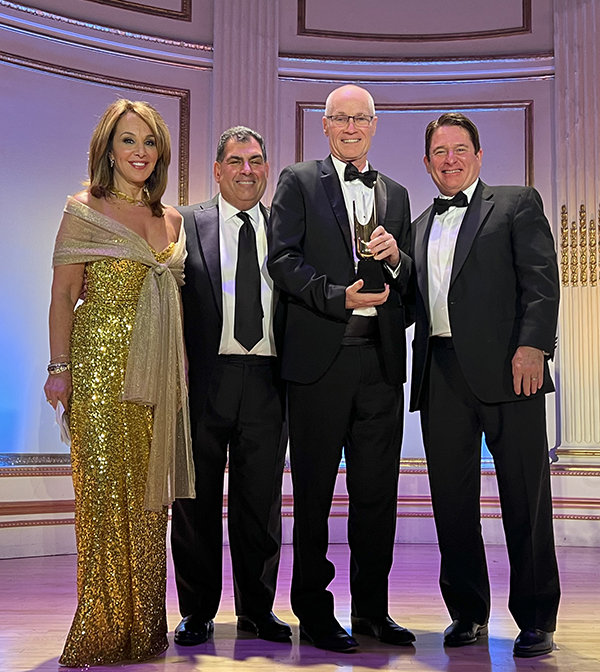
 provide aid to radio and television professionals in acute need. BFoA president Tim McCarthy says, “We’re very excited to have Soledad host this year’s Golden Mike Award dinner. She is a multiple award-winning broadcast journalist whose reporting has brought awareness on numerous issues to the forefront. Combined with her philanthropic endeavors, she is the perfect person to host our special evening.” This year’s BFOA Golden Mike Award honoree is Jack Abernethy, CEO of FOX Television Stations. The Lifetime Achievment Award will be presented during the gala frundraiser to Richard E. Wiley, former chairman, commissioner, and general counsel of the Federal Communications Commission and one of the most prominent media and telecommunications lawyers in broadcasting.
provide aid to radio and television professionals in acute need. BFoA president Tim McCarthy says, “We’re very excited to have Soledad host this year’s Golden Mike Award dinner. She is a multiple award-winning broadcast journalist whose reporting has brought awareness on numerous issues to the forefront. Combined with her philanthropic endeavors, she is the perfect person to host our special evening.” This year’s BFOA Golden Mike Award honoree is Jack Abernethy, CEO of FOX Television Stations. The Lifetime Achievment Award will be presented during the gala frundraiser to Richard E. Wiley, former chairman, commissioner, and general counsel of the Federal Communications Commission and one of the most prominent media and telecommunications lawyers in broadcasting. Scott Herman says, “Dick’s commitment to fight for our industry in Washington has given broadcasters the opportunity to grow their business. His strong belief in our industry has extended to his support of the mission of the Broadcasters Foundation to help those in our business who need it most. We are honored to present him with the Lifetime Achievement Award.” Wiley comments, “I am honored to receive this Lifetime Achievement Award from the Broadcasters Foundation. Since arriving at the FCC more than 50 years ago and co-founding our DC law firm almost 40 years ago, it’s been a privilege to work with broadcasters on landmark innovations including the development of high-definition TV. I’m proud to be a part of this great industry’s evolution, and to support the Foundation’s mission of providing a critical safety net for members of the broadcast profession.” The annual Golden Mike Award gala is a major fundraiser for the Broadcasters Foundation, the only charity devoted exclusively to helping broadcasters in acute need. For information, or to reserve a seat or table at the Golden Mike Award gala and fundraiser, please contact the Broadcasters Foundation at 212-373-8250 or
Scott Herman says, “Dick’s commitment to fight for our industry in Washington has given broadcasters the opportunity to grow their business. His strong belief in our industry has extended to his support of the mission of the Broadcasters Foundation to help those in our business who need it most. We are honored to present him with the Lifetime Achievement Award.” Wiley comments, “I am honored to receive this Lifetime Achievement Award from the Broadcasters Foundation. Since arriving at the FCC more than 50 years ago and co-founding our DC law firm almost 40 years ago, it’s been a privilege to work with broadcasters on landmark innovations including the development of high-definition TV. I’m proud to be a part of this great industry’s evolution, and to support the Foundation’s mission of providing a critical safety net for members of the broadcast profession.” The annual Golden Mike Award gala is a major fundraiser for the Broadcasters Foundation, the only charity devoted exclusively to helping broadcasters in acute need. For information, or to reserve a seat or table at the Golden Mike Award gala and fundraiser, please contact the Broadcasters Foundation at 212-373-8250 or